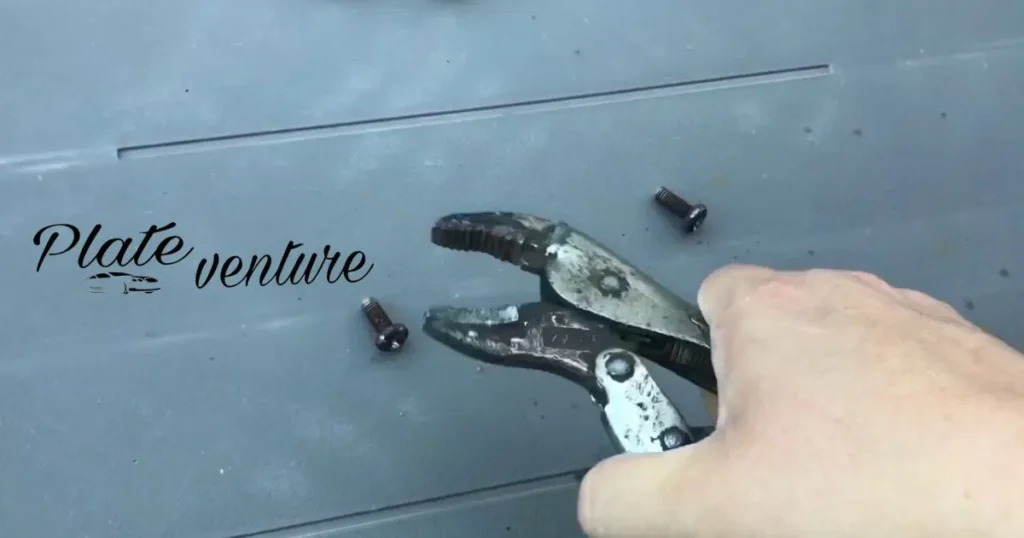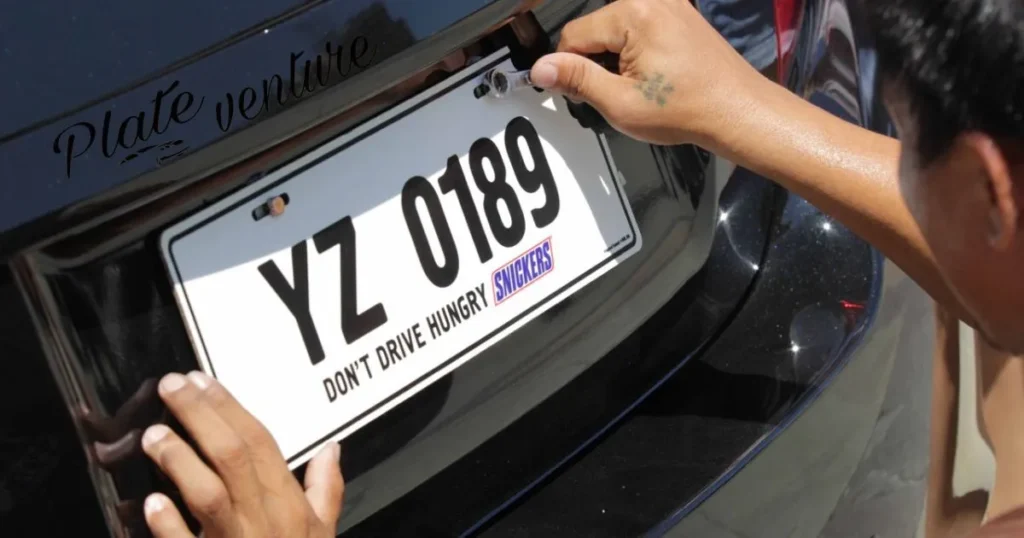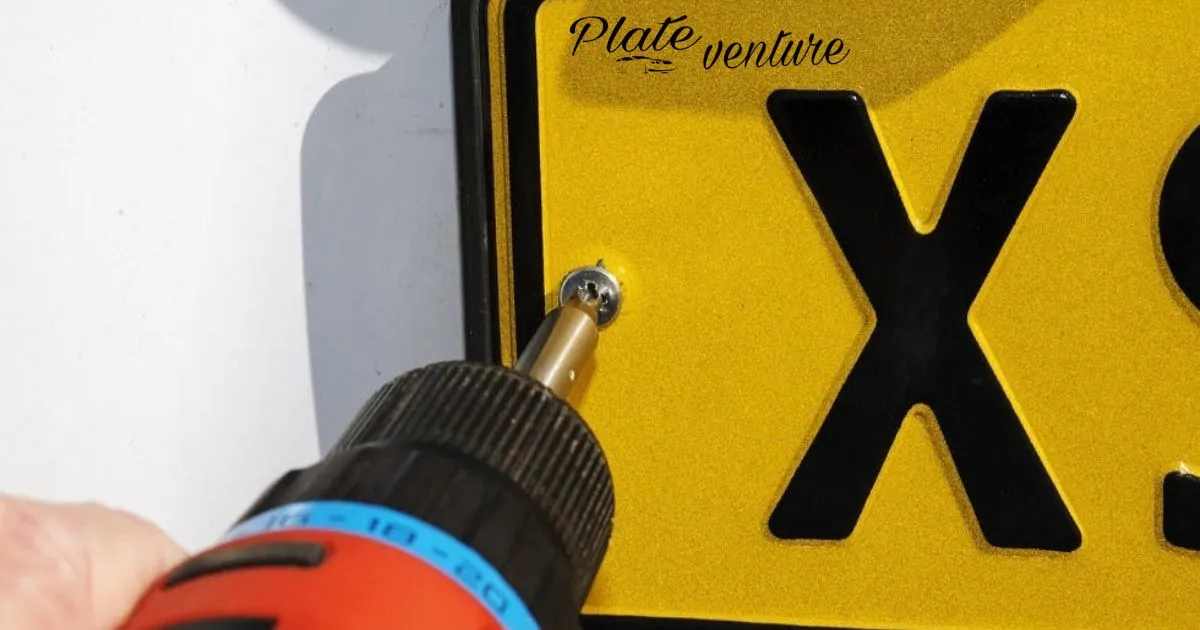Screw size for license plates refers to the specific dimensions of the screws used to attach license plates to vehicles. License plate screws typically have a diameter between 0.25 and 0.375 inches and a length between 0.5 and 1.5 inches. The most common screw size used is a 8 or M4 screw size with a diameter of roughly 0.164 inches.
When purchasing or replacing license plate screws, screw size matters. Using screws that are too big can damage the license plate or vehicle, while screws that are too small may not hold the license plate securely. Getting the right license plate screw size ensures a proper fit and keeps your license plate safely and snugly attached to your car, truck, or motorcycle.
While they may seem insignificant, even small hardware like license plate screws are engineered to strict specifications. From diameter to thread pitch to length and head shape, every detail of a license plate screw is designed to balance ease of installation, durability, and a secure hold. Using screws specifically made for license plates helps minimize vibration and prevents the screws from loosening over time.
What size screws are best for mounting license plates?
The most common license plate screw size is #8 or M4. These provide enough threading and shear strength to securely fasten a license plate without risking damage. Using a #6/M3 screw risks stripping the threads, while a #10/M5 is overkill and uses a larger hole size.
What is the standard license plate screw size?
As mentioned above, the standard license plate screw size used across most states and countries is a #8 or M4 machine screw. This matches the pre-drilled hole size and thread pitch in most license plate frames and mounting brackets. The most common thread pitch for license plate screws is 32 threads per inch or 0.8mm thread pitch.
How long should license plate screws be?
Most license plates require a screw length between 3/8″ and 5/8″ (10-16mm). Shorter screws may not fully seat through thicker frames or plates. Longer screws over 5/8″ risk damaging radiators, bumpers, or wiring behind the plate. Stainless steel license plate screws often come in a 3/8″ or 1/2″ standard length.
What types of license plate screw heads are there?
The most common license plate screw head styles are pan head, truss head, and hex washer head. Pan and truss provide a smooth rounded head to prevent snagging while still countersinking flush into the frame. Hex washer heads offer more grip for tightening with a wrench and have a built-in washer to spread force. Phillips and slotted drive types are also options.
What factors determine the best license plate screw size?
The best license plate screw size depends on the screw thread specifications of your vehicle’s license plate bracket holes, the thickness of your license plate and any frame, and whether you want standard or security screws. Most vehicles use #14 x 3/4 inch screws in the US or M6 x 20mm screws in metric countries, but thicker frames may need 1 inch or longer screws.
How does license plate hole size impact screw size?
If the holes on your license plate or vehicle’s bracket are too large, screws can loosen over time or fail to keep the plate securely mounted. Proper fitting screws that match the thread size of the holes will tighten snugly for a sturdy mount. Using screws that are too large or small for the threads can also damage the holes.
Should thicker or thinner license plates use different screw sizes?
The thickness of the license plate impacts the ideal screw size needed. Thinner license plates generally require shorter screws while thicker plates need longer screws. This helps ensure proper securing of the license plate without damaging it.
| License Plate Thickness | Ideal Screw Size | Reason |
| Thin license plates | Shorter screws (e.g. 8-10mm) | Prevent screws from poking through plate |
| Thick license plates | Longer screws (e.g. 12-16mm) | Ensure sufficient thread engagement with plate bracket |
In summary, thinner license plates should use shorter license plate screws to avoid poking through the plate, while thicker plates need longer screws for adequate holding strength. The screw length should match the overall thickness of the plate plus bracket to find the best fit.
Do license plate screw sizes vary by vehicle type?
Most passenger vehicles use standard #14 or M6 metric license plate screws. But some vehicles, especially trucks or commercial vehicles, may require specialty bolts or non-standard sizing. This is why it’s important to check your vehicle’s manual or specifications instead of assuming a common screw size will fit.
What screw size is least likely to damage my license plate?
Using a screw size that correctly matches the threading of your license plate holes is least likely to cause damage. This allows the screws to thread properly without stripping the holes.
Avoid screws that are too large or too small in diameter. And make sure screw length accommodates the total thickness to prevent cracking plates or frames when tightening.
Why does license plate screw size matter?
The size of license plate screws is important because using the wrong size can lead to legal issues, safety hazards, and additional costs. 1 States have regulations for license plate specifications, including permissible screw sizes.
Using incorrect screws violates these laws and can result in fines or penalties. The standard US license plate screw size is #14 x 3/4 inch. 1 This size is compatible with most license plates and vehicles.
Can wrong sized screws damage my license plate?

Yes, incorrect screw sizes can damage license plates. 13 If the screws are too long, they risk penetrating interior brackets or plastics behind the plate during installation. Overly long screws can also scratch vehicle paint.
On the other hand, screws that are too short fail to properly secure the plates. This allows vibration from driving to loosen the plates over time until they detach and get lost on the road. Both situations incur unnecessary expenses to replace damaged parts or lost plates.
Can using the wrong license plate screws lead to lost plates?
Using improper sized license plate screws can result in lost plates while driving. 13 Incorrect lengths, either too short or too long, prevent the screws from properly securing the plates to the vehicle.
The plates then loosen over time from wind resistance and vibration until they detach and get lost on the road. This poses safety hazards to the driver and other motorists. Replacing lost plates creates unnecessary costs and inconveniences as well.
Do larger or smaller license plate screw sizes impact security?
Yes, improper license plate screw sizes impact security. Screws that are too small fail to adequately secure the plates, allowing thieves to more easily steal them. 1 Stolen plates can then be used to disguise vehicles involved in other crimes.
Choosing larger screw sizes enhances security by making license plate theft more difficult. Larger screws are also less prone to loosening over time compared to smaller screws.
What risks are there with improperly sized license plate screws?
5 potential risks of using improperly sized license plate screws:
- Loose plates – Screws that are too short or loose may fail to properly secure the license plate, allowing it to rattle, turn sideways, or even fall off completely while driving.
- Damage to vehicle – Overly long screws can crack or pierce the license plate frame/bracket, damage the bumper surface underneath, or obstruct moving parts behind the plate.
- Inability to install plate – If the screws are too large or small for the license plate holes, you may be unable to properly install the plate to your vehicle.
- Violation of regulations – Using non-compliant screws could violate local vehicle regulations and lead to fines or penalties.
- Safety hazard – An unsecured license plate poses dangers for other motorists if it falls onto the road. Loose plates also impede law enforcement’s ability to identify vehicles.
Using the wrong license plate screw size can lead to a variety of issues from minor nuisances to major safety and legal concerns. Using screws specifically designed for license plates helps avoid these risks.
How can I identify the right license plate screw size?
The most common license plate screw size in the US is 1/4-inch diameter, 14 threads per inch, and 3/4-inch length. However, metric screws like M6 x 20mm are also used. Check your vehicle manual or mounting bracket for the recommended size. Measure the thread diameter, length, and pitch to identify the screws.
Where can I find my vehicle’s license plate screw size recommendations?
Your vehicle’s manual, license plate mounting bracket, or dealership can provide the recommended screw size. For example, a bracket may state “use 6mm or 1/4-inch self-tapping screws.” The manual outlines if metric or standard sizing is used.
What measurements do I need to bring when buying new license plate screws?
Bring the screw’s thread diameter (1/4-inch), length (3/4-inch), and thread pitch (14 threads per inch). Also know whether you need standard or metric sizing. Measure your current screws or check recommendations to get these details.
Should I reuse old license plate screws or buy new ones?
It’s best to use new license plate screws when installing a new plate rather than reusing old screws. Over time, screws can become stripped or rusted. New screws ensure a secure mount. Only reuse undamaged screws if necessary.
How can I measure my license plate holes for screw sizes?
Use a thread gauge tool to measure the diameter and thread pitch of the holes. Also measure depth to determine the necessary screw length. This provides the details needed to identify and buy properly sized new screws if recommendations are unavailable.
Where can I buy properly sized license plate screws?

You can purchase properly sized license plate screws from auto parts stores, hardware stores, online retailers, and some car dealerships. When buying screws, pay attention to the screw length and thread diameter, which need to match the holes on your license plate frame or mounting bracket.
Auto parts stores typically have a decent selection of common license plate screw sizes, like 1/4-14 x 3/4″ screws, which fit many vehicles. You can also find specialty screws for European or Japanese cars. Buying online gives you more size options, including metric screws, but you need to confirm fitment.
Do auto parts stores have various license plate screw sizes?
Most national auto parts store chains like AutoZone, O’Reilly, Pep Boys, and Advance Auto Parts carry license plate screws in the most common sizes needed for American and some foreign vehicles. For example, they usually stock 1/4-14 thread screws in lengths ranging from 1/2 inch to 1 inch.
You can also find various head styles like pan heads, button heads, and hex heads. However, auto parts stores may not have more obscure metric sizes or custom lengths needed for rare vehicles or special mounting brackets. They focus on the most widely used screws.
Can I order custom sized license plate screws online?
Yes, you can order custom license plate screws on many online hardware retailers if you know the specific size needed. For instance, Home Depot and McMaster-Carr allow you to select the thread diameter, length, head shape, material, and finish to order screws tailored to your vehicle.
Amazon also has some specialty license plate screw sizes not found in stores. This allows you to find an exact match if you have unique license plate mounting requirements. Just be sure to accurately measure your existing screws or mounting holes first.
What brands make quality license plate screws?
Some reputable screw brands that manufacture license plate fasteners include Hillman, ACE Hardware, McGard, and Fastenere. These companies focus on hardware and produce high-quality steel screws designed to last.
Other auto accessory brands like Lund International and Go-Rhino also sell license plate screws as part of their vehicle customization lineup. And major fastener brands like ASTM and SAE provide specifications that quality license plate screws should meet for optimal durability.
Are there specialty stores focused on license plate screws?
There are not many specialty retailers devoted solely to license plate screws. However, there are online stores that market to auto dealerships and vehicle custom shops that may offer a wider variety than typical retail stores.
For example, mbrMarketing.com and MyLicencePlateScrews.com focus on license plate related hardware for professional installers, including screws in various sizes and styles. And stores like BuyLicensePlates.com sell license fastener assortments targeted specifically towards consumers needing screws.
Frequently Asked Question
What is the most common license plate screw size?
The most common license plate screw size is 1/4-inch diameter, 14 threads per inch, and 3/4-inch length.
Do all cars use the same license plate screw size?
No, license plate screw sizes can vary between makes and models – there is no universal standard size.
Where can I buy specialty license plate screws if needed?
You can find specialty license plate screws at most hardware stores or order custom sizes online.
How can I measure my existing license plate screws?
Use a ruler to measure the length and a thread gauge tool to determine the thread diameter and density.
What do I do if my license plate screws are lost or damaged?
Check your owner’s manual for the recommended replacement screw size or take your vehicle to the dealership service center.
Conclusion
The most common license plate screw size is 1/4-inch diameter and 3/4-inch length. This fits most cars in the United States. Some cars use metric screws instead. Metric license plate screws are often M5, M6, or M8 sized.
To find your car’s right screw size for license plate, check the manual. Also look at the license plate bracket. It may say what screws to use. If not, remove a screw and measure it. Or measure the holes in the bracket. This gives the diameter and length to buy new screws. Use thread gauges to test holes. Getting the right screws keeps your plate secure.








